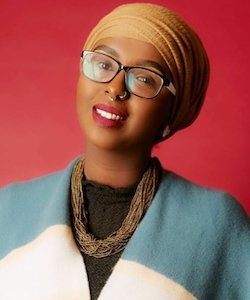Leverage collaboration, build momentum to close diversity gaps: BlackNorth Initiative CEO
There have been significant strides in reaching greater equity for Black Canadians, but it’s time now to build momentum and narrow diversity gaps, says Dahabo Ahmed-Omer, CEO of BlackNorth Initiative.
The organization launched in 2020 in the wake of public outrage over the death of George Floyd, an African-American man who was murdered by a white police officer in Minneapolis, Minnesota. BlackNorth’s primary goal is to uplift and empower Black Canadians through mentorship, educational, wellness and housing supports, in addition to calling on senior business leaders to commit to targets for increased representation of Black people in boardrooms and executive suites.
“The biggest barrier is always time. It takes time for a system to shift or policies to be changed, for mindsets to catch up with policies.”
Dahabo Ahmed-Omer, CEO, BlackNorth Initiative
The non-profit organization kicked off with 500 signatories who committed to the mandate of change, with BlackNorth serving as the bridge between communities and corporations. Ahmed-Omer said they are seeing more Black people recruited and promoted, but further action is needed to make sure those employees are thriving in those workplaces. Black Canadians make up 4.3 per cent of the population, but are disproportionately under-represented in C-suite and leadership positions.
Mandated equity goals, required workforce training and development opportunities and compensation-based targets can help accelerate progress for recruiting and promoting Black employees, she said. The benefits are big, not just for the Black employees but also for the employers.
“First and foremost is that the culture shifts. And the moment the culture shifts, we’re capable of achieving great heights because people feel good being at work. They feel welcome, they feel like they’re part of something bigger than themselves,” she said. “And it’s a prosperous future for the company because the people that you’re bringing in have a diverse perspective, and the more diverse views and intellect that you have, the more you’re able to cater to communities and you’re able to foresee potential challenges and risks.”
February is Black History Month, and Ahmed-Omer said it is an opportunity to draw attention to issues around anti-Black racism, but also a chance to celebrate the many achievements and contributions of Black Canadians.
“It’s a moment to say ‘I’m proud of me,’” she said.
Ahmed-Omer said there was an “awakening” in 2020, when people began to truly understand systemic racism and its impact on Black communities. The conversation shifted.
“We no longer had to convince people that systemic racism exists…it’s something that is understood and can not be debated,” she said.
As for eradicating discrimination, Ahmed-Omer said there is a lot of catching up to do, but she’s more hopeful than ever it will happen.
“We just have to keep up the momentum, and we have to sustain this. We don’t need another George Floyd and we’ve never needed George Floyd’s murder to wake us up. But we are here now and we have to make sure that we honour that because we did make a commitment,” she said.
Shaking up systems that have long operated in a certain way can be a “tough pill to swallow,” Ahmed-Omer said.
“The biggest barrier is always time. It takes time for a system to shift or policies to be changed, for mindsets to catch up with policies,” she said, adding that the rewards are powerful.
“We just have to keep up the momentum, and we have to sustain this. We don’t need another George Floyd and we’ve never needed George Floyd’s murder to wake us up.”
“Five or six different minds are better than five or six of the same minds. I say that all the time because I think it’s important for people to understand that when you bring different ideas to the table, you’re able to do better because you’re really catching everything, you’re catering to as many mindsets as possible.”
Ahmed-Omer sees BlackNorth Initiative’s goals as closely aligned with the Coalition for a Better Future: collaborating to build economic resilience and strengthen Canada’s social fabric. She praised the Coalition’s efforts to bring together leaders, organizations, nonprofits, businesses and civil society.
“It’s everyone’s problem. It’s not one sector’s problem, and now everybody should be part of the solution. I think the concept of a coalition is very much part of what we do as well,” she said.


